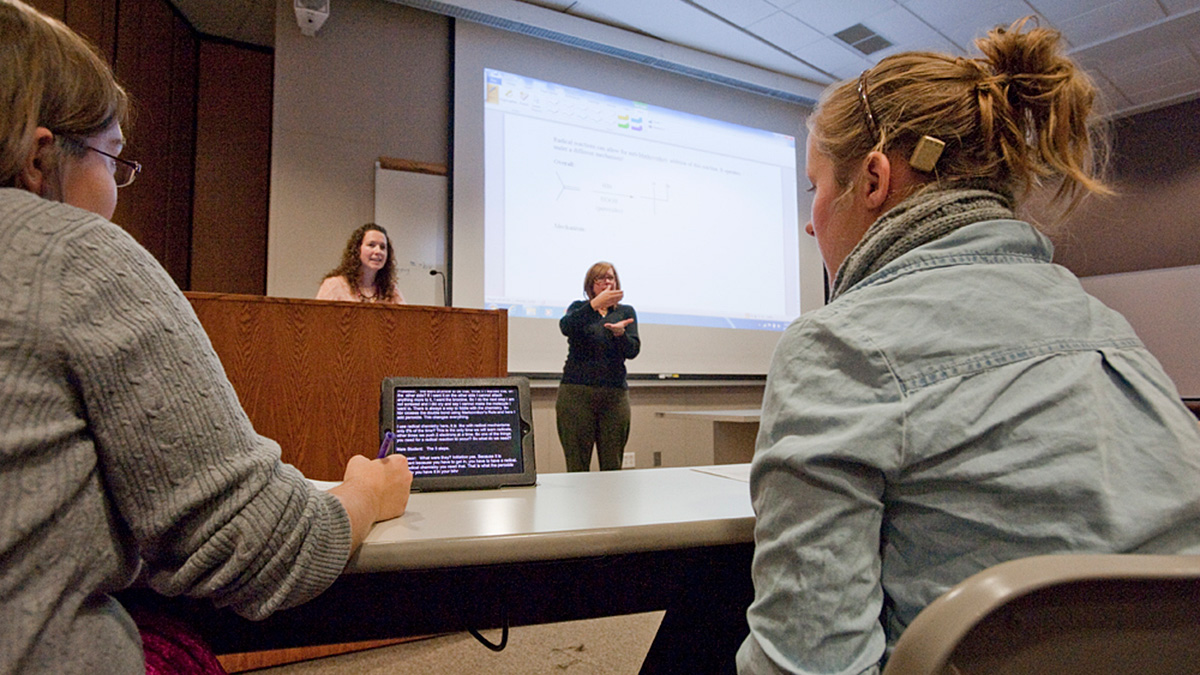Access Services and Support

Access Services and Support
- RIT/
- National Technical Institute for the Deaf/
- Academics/
- Access Services and Support
Access Services Scheduling Office
Hugh L. Carey Hall - 1515
585-475-6281
accessservices@rit.edu
If you take courses at NTID, faculty members will communicate directly with you using a variety of communication strategies, which may include sign language with voice, sign language without voice, spoken language (FM/Roger systems are available*), printed/visual aids, web-based instructional materials, and individual tutoring.
In cases where a faculty member’s communication strategies do not appropriately meet your needs, you can request access services from the Department of Access Services for courses at NTID via the MyAccess.RIT.edu website.
As a student taking NTID courses, you will have access to a state-of-the-art learning center staffed by professional and peer tutors. An assigned counselor will work closely with you to help you plan your collegiate experience and provide you with personal, social, career, and academic advising and counseling services.
*FM/Roger systems are available through the Department of Communication Studies and Services (CSS) at NTID. You can borrow an FM/Roger system at any time. For more information or to request an FM/Roger system, please stop by the Audiology Center, Johnson (LBJ) Hall 60-3130, or contact CSS.
If you qualify to take courses in RIT’s College of Art and Design, Saunders College of Business, Golisano College of Computing and Information Sciences, Kate Gleason College of Engineering, College of Engineering Technology, College of Health Sciences and Technology, College of Liberal Arts, College of Science, School of Individualized Study, or Golisano Institute for Sustainability, RIT will provide the educational access services you need. You can choose from among sign language interpreting services, FM/Roger systems, notetaking, or real-time captioning services by contacting the Department of Access Services. Alternative services also may be provided. You also will have access to a unique array of educational support services such as tutoring by experienced faculty tutors, personal and career counseling, and academic advising.
Interpreting
RIT has the largest staff of professional sign language interpreters of any college program in the world. Last year, RIT provided nearly 118,000 hours of interpreting services. In addition to classroom interpreting, you also may request interpreting services for non-academic activities such as athletic events, religious services, student government meetings, guest presentations, and other student life activities.
Notetaking
Trained student notetakers record information during class or laboratory lectures, discussions and multimedia presentations. The resulting class notes are uploaded to the web, so you can easily access them. Last year, RIT provided more than 30,000 hours of notetaking services for students.
Real-time Captioning Services
This service provides a comprehensive English text display of classroom lectures and discussion. Students read this text during class and may print it as a permanent record of class discussions.
Personal FM/Roger Systems
FM/Roger systems are available through the Department of Communication Studies and Services (CSS) at NTID. You can borrow an FM/Roger system at any time. For more information or to request an FM/Roger system, please stop by the Audiology Center, Johnson (LBJ) Hall 60-3130, or contact CSS.
Group FM/Roger Systems
There are pre-installed loop systems in many rooms, auditoriums, and theaters. Signage outside the venue indicates that there is a system present and informs the user where the receivers can be obtained (e.g. box office, sound control booth, NTID Help Desk). Individual and group FM/Roger systems are also available for special events and other areas that are not equipped with pre-installed systems. Contact the NTID Help Desk, the CSS chairperson, or CSS for more information about borrowing these devices.
Tutoring
Faculty tutors help answer your questions and clarify concepts and information taught in your RIT classes. They can also discuss programs and career goals with you and help you prepare for cooperative (co-op) work experiences. These faculty are skilled at working with Deaf and hard-of-hearing students of all communication modes.
If you qualify for these programs, NTID instructors will use a variety of communication strategies to communicate directly with you in your courses. In cases where a faculty member’s communication strategies do not appropriately meet your needs, you can request access services from the Department of Access Services for courses at NTID via the MyAccess.RIT.edu website. For courses in your program that are taught by faculty members in RIT's eight mainstream colleges, you also may request access services. In addition, you can take advantage of educational support such as tutoring by experienced faculty tutors, and personal and career counseling. These faculty are skilled at working with deaf and hard-of-hearing students of all communication modes.
If you enroll in the MSSE program, faculty will communicate with you using sign language and speech in small, personalized classes.
Hours of Access Services Provided
| in classroom | outside classroom | |
|---|---|---|
| Interpreting | 89,299 | 43,415 |
| Captioning | 24,944 | 1,646 |
| Notetaking | 48,330 |




